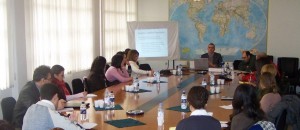

After showing a video of recent demonstrations in the Tunisian capital, Giragosian noted that “the wave of unrest was largely a leaderless revolution that was both sudden and spontaneous.” He traced the lack of leadership to the fact that “most of the demonstrators were driven by a spontaneous reaction to the accumulation of frustration, hopelessness and humiliation of years of corruption, restrictions on political freedoms and a general arrogance of power exhibited by the Tunisian government.”
He further noted that the recent developments in Tunisia were especially significant for Armenia, as the situation demonstrated five key factors: (1) the inherent weakness and vulnerability of states hindered by little real legitimacy; (2) the sudden and explosive power of public rage and discontent; (3) the economic and demographic roots of such popular discontent; (4) the power of the Internet and social media tools in terms of activism and organization; and (5) the cumulative effects of an “arrogance of power” by the ruling political elite. The analysis also examined the impact of economic pressure on political stability and development.
Giragosian concluded by stressing that “although there were several broader lessons from the Tunisian situation, what was most crucial for Armenia was the recognition of the danger of ignoring public demands for change and the need for deeper and durable reform.” He also stated that “the lessons from Tunisia were even more applicable to the case of Azerbaijan, mainly due to the dynastic nature of the Azerbaijani government, making Baku especially vulnerable to growing discontent and possible unrest in the face of a pronounced lack of legitimacy and its notable disregard for democratic reforms.”
Open Letter on the Proposal to Rename the Armenia-Turkey Border Crossing After Talat Pasha
We express our deep concern and disappointment regarding the recent proposal introduced…
- MassisPost
- July 3, 2025
- No comments
- 2 minute read
Pashinyan’s Visit to Turkey and Beyond
By KRIKOR KHODANIAN At the invitation of Turkish President Recep Tayyip Erdoğan,…
- MassisPost
- June 29, 2025
- No comments
- 3 minute read
“I Still Can’t Believe What Happened on June 20”
By LUSYEN KOPA Exactly three months ago, I wrote an article titled…
- MassisPost
- June 26, 2025
- No comments
- 4 minute read
Anniversary of the Immortality of the Twenty Hnchakian Heroes
By KRIKOR KHODANIAN 110 years ago these days, the prominent figures of…
- MassisPost
- June 15, 2025
- No comments
- 3 minute read










